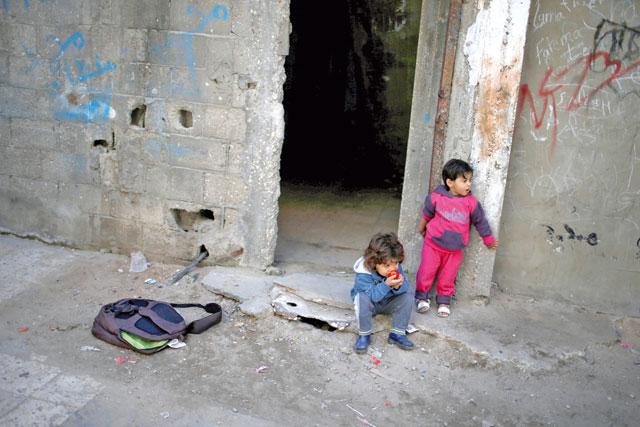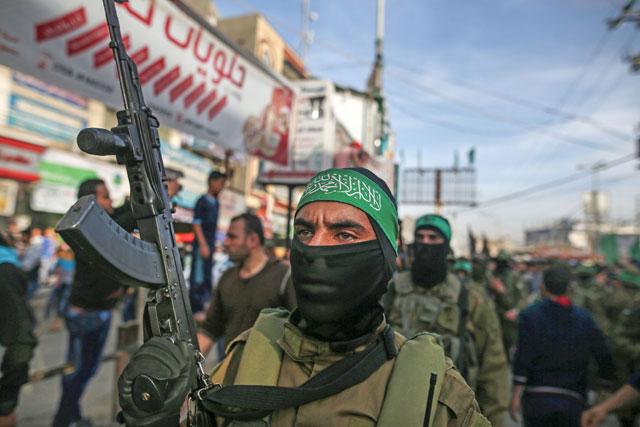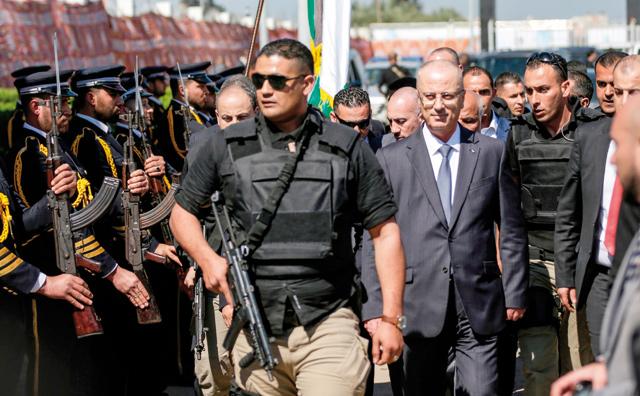You are here
Palestinian PM attacked in Gaza — What does it mean?
By AFP - Mar 15,2018 - Last updated at Mar 15,2018

Palestinian children look on outside their house at Shati refugee camp in Gaza City on Wednesday, where an attack on Palestinian Prime Minister Rami Hamdallah was seen as an attempt on national reconciliation efforts (Reuters photo)
RAMALLAH, Palestinian Territories — Palestinian Prime Minister Rami Hamdallah survived an apparent assassination attempt in Hamas-ruled Gaza this week when a roadside bomb blew up near his convoy.
The blast came as an October reconciliation agreement aimed at ending a decade-long split between “Islamist” movement Hamas and Fateh, which dominates Hamdallah's government, edged towards collapse.
Here is what is known about the incident so far and the potential impact it could have:
What happened?
On Tuesday, Hamdallah was beginning a rare visit to the Gaza Strip when an explosion rocked his convoy, leaving him uninjured but lightly wounding six security guards.
The roadside bomb, believed to have weighed around 15 kilogrammes, exploded a few hundred metres from the border with Israel, shortly after Hamdallah's convoy entered the territory. A second bomb failed to explode, officials said.
Who was behind it?
The short answer is that it’s not clear — there has been no claim of responsibility.
Palestinian President Mahmoud Abbas immediately said Hamas was responsible, since it is in charge of security in Gaza, but stopped short of accusing the group of directly carrying it out.
Hamas in turn blamed Israel.
Other suspects include smaller, more radical Islamist groups that operate in Gaza, but are opposed to Hamas.
A senior Hamas official narrowly survived an assassination attempt in October, believed to be the work of extremists.
The attack could also have been the work of hardline Hamas factions opposed to negotiations with the Palestinian Authority.
Hamas said it had launched an investigation into the attack, detaining a number of suspects.
Why was it a rare visit?
Gaza, with its two million residents, forms a large part of the Palestinian territories.
But since Hamas seized control in 2007, the internationally-recognised government headed by Hamdallah has had only nominal power in the Strip.
Hamas controls the police, security and other government services, while Abbas’ administration is based in the West Bank. Its ministers visit only sporadically.
In October, Hamas agreed to hand Gaza back to Abbas’ Palestinian Authority in an Egyptian-brokered reconciliation deal which has since faltered.
Key sticking points include the fate of Hamas’ vast armed wing, which has fought three wars with Israel since 2008, and the future of tens of thousands of civil servants.
Little progress has been made in recent months.
Does this destroy reconciliation?
Hamdallah’s attempted assassination could prove a fatal blow for any remaining hope of a negotiated handover of power.
After the attack, Hamdallah said he still wanted reconciliation. But a senior Palestinian official told AFP that Abbas has suspended all official visits to Gaza for fear of further attacks.
That could further complicate aid programmes in the desperately poor enclave.
Israel has blockaded Gaza for a decade, its economy has slumped and residents currently receive only a few hours of electricity a day.
Western governments for the most part do not communicate with Hamas, so those who want to support Gaza do so through Hamdallah’s government.
His visit Tuesday was to open a wastewater treatment facility paid for by international donors.
Does it increase the
risk of violence?
Gaza’s neighbours Egypt and Israel have expressed concern about the situation in Gaza in recent months, as fears grow that the deteriorating situation could lead to another round of conflict.
Neither has opened its border, however.
This week the US government held a meeting in Washington to discuss the future of Gaza — without any Palestinian representatives.
It did not invite Hamas, which it considers a terrorist organisation, while Abbas and his officials are boycotting Trump’s administration over his controversial recognition of Jerusalem as Israel’s capital.
Global powers are meeting in Rome Thursday to try to raise money for the UN’s agency for Palestinians refugees, which faces a desperate shortage after the US froze tens of millions of dollars in funds.
US President Donald Trump is expected to launch a proposal for Israeli-Palestinian peace in the coming weeks.
The contents have been kept secret but Hamas has already rejected it, accusing his administration of pro-Israel bias.
Any peace plan would likely be stillborn if it does not find a solution to the issues of Gaza and Hamas.
Related Articles
NUSEIRAT, Palestinian Territories — The man Hamas called the main suspect in a bomb attack against the Palestinian prime minister in Gaza wa
GAZA CITY, Palestinian Territories — A bomb blast targeted Palestinian Prime Minister Rami Hamdallah’s convoy during a rare visit to the Gaz
GAZA CITY, Palestinian Territories — Hamas on Saturday closed the Gaza offices of a major telecommunications firm, accusing it of failing to


















